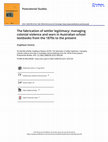Papers by Angelique Stastny
Journal of Geography Education, 2023
This article explores the ways in which Indigenous Ecological Knowledge (IEK) and sustainable dev... more This article explores the ways in which Indigenous Ecological Knowledge (IEK) and sustainable development are represented in New Caledonian Geography textbooks and curricula. Our case study shows that state-driven Environmental and Sustainability Education is often linked to implicit neoliberal values and the paradigm of economic growth, and marginalizes Kanak Indigenous knowledge and practices. IEK is rooted in land, sea, and resource governance. It is therefore necessary to think Kanak knowledge beyond current institutional boundaries. We believe that customary principles, values, and ecological knowledge of Kanak cultures should find a rightful place in formal education.
in La Nouvelle-Calédonie et l’imagination intellectuelle. Repenser et reformuler les disciplines... more in La Nouvelle-Calédonie et l’imagination intellectuelle. Repenser et reformuler les disciplines, savoirs et pratiques, edited by Hamid Mokaddem, Scott Robertson & Ingrid Sykes (L'Harmattan)
The Funambulist, "Publishing the Struggle", 2019

Postcolonial Studies, 2019
There has been a lot of discussion among historians and politicians about how Australians have be... more There has been a lot of discussion among historians and politicians about how Australians have been, and are, taught about Australia’s colonial history at school. However, no scholar has undertaken a long-term analysis of Australian school textbooks to address this question. This article provides the first long-term analysis of Australian school history textbooks and explores the ways in which colonial violence and colonial wars have been presented in those texts. This article combines a quantitative analysis of textbook content about colonial violence and wars with a discursive analysis of such material. The findings from the research call for a more complex understanding of the ‘great Australian silence’ theory. My research shows that colonial violence and wars are mentioned throughout the period in almost all textbooks in the sample. More importantly, this research illuminates the ways in which colonial violence has been managed in these historical texts to sustain settler legitimacy. Such a contribution provides a more precise understanding of settler-colonial power at work in the production of historical knowledge and in the maintenance of its hegemony.
/// To access article and download free eprint: https://www.tandfonline.com/eprint/RTU54UMYTGU5XPI8RCWT/full?target=10.1080/13688790.2019.1655184

This chapter will explore how research into non-Indigenous attitudes and
identities surfaces cert... more This chapter will explore how research into non-Indigenous attitudes and
identities surfaces certain forms of reflexive self-awareness in the course of Australian conversations about Australia’s history and about Aboriginal and Torres Strait Islander peoples and cultures. Emerging research from Canada and Australia highlights the ideational and connotative significance of non-Indigenous people’s discourse styles for their self-understanding ‘as non-Indigenous’. Recent focus group research in Canada (de Costa and Clark 2015) suggests that we may characterise variations in non-Indigenous attitudes to settler-colonial history and to Indigenous people and cultures in terms of ‘delegation’ and ‘embodiment’. This chapter will examine in close detail eight recent focus groups conducted at locations around Australia to ask what stylistic and semantic paradigms of reflexive self-awareness may characterise non-Indigenous discourses in Australia.
Schools are understood as an important site for the circulation of discourses pertaining to colon... more Schools are understood as an important site for the circulation of discourses pertaining to colonisation and reconciliation. Wider community educational practices have also engaged with these concerns, including initiatives such as the Reconciliation Study Circle Kits that were developed by the Council for Aboriginal Reconciliation in Australia in the 1990s. This paper considers the role of school and community education in developing non-Indigenous Australians' understanding of, and engagement with, Australia's post-invasion history and reconciliation with Aboriginal and Torres Strait Islander peoples. Drawing on original focus group and interview research the paper highlights some of the key areas where education appears to have transformed non-Indigenous perspectives in recent decades, while also highlighting areas for further policy and curriculum development.
The means by which ideologies are spread is of growing interest to scholars. In comparative indig... more The means by which ideologies are spread is of growing interest to scholars. In comparative indigenous studies, much attention has been given to the political links that developed throughout the mid to late-twentieth century between activist organisations that sought greater freedom and rights for indigenous or racially marginalised populations. This paper looks at the early contact between American Black Panthers and indigenous activist organisations in Oceania in the
1960s and ’70s. It illustrates how various ideological frameworks, such as colour consciousness, and confrontational strategies, such as takeovers, were exchanged during this period. This interaction suggests that Australian and New Zealand indigenous organisations, borrowing from American activists, adapted ideologies and strategies that worked within their local political contexts.
Media and Commentary by Angelique Stastny
Publié dans Le Monde, le 3 novembre 2018, p.19
Publié dans Libération le 1 novembre 2018
liberation.fr/debats/2018/11/01/nouvelle-caledonie-qu... more Publié dans Libération le 1 novembre 2018
liberation.fr/debats/2018/11/01/nouvelle-caledonie-quelle-non-participation-kanak-au-referendum_1689270
Book Reviews by Angelique Stastny
The French Australian Review, 2020
This book published in French in 2017, details the political journey of Yeiwene Yeiwene (1945–198... more This book published in French in 2017, details the political journey of Yeiwene Yeiwene (1945–1989), one of the leaders of the Kanak Independence movement in New Caledonia. The biographer presents him first and foremost as a man of action, close to the people who initiated action at the grassroots level, as well as being a man who took on high positions within institutions and companies. The reviewer acknowledges the importance of this book in documenting the life of this important Kanak leader and encouraging readers to learn more about the struggle for independence in Kanaky/New Caledonia.
/// https://www.isfar.org.au/category/explorations/no-67/
Books by Angelique Stastny

How is colonial history taught in schools? And how do education systems impact power relations be... more How is colonial history taught in schools? And how do education systems impact power relations between Indigenous people and settlers? This book provides a unique contribution to international discussions about knowledge production and the teaching of colonial history in schools with a comparative analysis of two neighboring settler-colonial societies of the South Pacific. Angélique Stastny argues that school systems in Australia and Kanaky/New Caledonia continue to enact British/Australian and French colonialism, respectively, by leveraging historical narratives that fail to comprehend and willfully ignore the mechanisms and contemporaneity of settler colonialism. Settler regimes of ignorance are sustaining the political status quo of settler-colonial power. Stastny's work examines this weaponization of ignorance in systems so often focused on the production of knowledge to deepen our understanding of how and why settler-colonial agendas operate in public primary and secondary schools. Ignored Histories takes the reader through the evolution of policy directives for history curricula, historiography and the narratives produced and disseminated in textbooks, and the author's own ethnography on teachers' actual practices and experiences. As the story unfolds, it traces the recounts of colonial wars and massacres in textbooks; presents modern accounts of the continuing marginalization - and outright exclusion - of Indigenous historians, practitioners, and knowledge from both curriculum development and pedagogy; problematizes students' disengagement from learning about their own histories; and brings to light lingering effects of white supremacy and ways to counter them. Some history teachers, on an individual level, engage in insurgent educational strategies in an attempt to shift power relations between Indigenous people and settlers. From the interviews Stastny conducted, we learn that some of these teachers were fired; others successfully developed methods to destabilize and rethink institutional practices and effect change in the classroom. Ultimately, Stastny argues for a system-wide transformation that decolonizes history curricula and the teaching of history by prioritizing Indigenous resurgence, understandings, and knowledge; acknowledging and addressing the difficult truths of the past; and ethically shaping the stories of today.








Uploads
Papers by Angelique Stastny
/// https://thefunambulist.net/magazine/22-publishing-struggle/anti-colonialism-black-power-indigenous-periodicals-pacific-angelique-stastny
/// To access article and download free eprint: https://www.tandfonline.com/eprint/RTU54UMYTGU5XPI8RCWT/full?target=10.1080/13688790.2019.1655184
identities surfaces certain forms of reflexive self-awareness in the course of Australian conversations about Australia’s history and about Aboriginal and Torres Strait Islander peoples and cultures. Emerging research from Canada and Australia highlights the ideational and connotative significance of non-Indigenous people’s discourse styles for their self-understanding ‘as non-Indigenous’. Recent focus group research in Canada (de Costa and Clark 2015) suggests that we may characterise variations in non-Indigenous attitudes to settler-colonial history and to Indigenous people and cultures in terms of ‘delegation’ and ‘embodiment’. This chapter will examine in close detail eight recent focus groups conducted at locations around Australia to ask what stylistic and semantic paradigms of reflexive self-awareness may characterise non-Indigenous discourses in Australia.
1960s and ’70s. It illustrates how various ideological frameworks, such as colour consciousness, and confrontational strategies, such as takeovers, were exchanged during this period. This interaction suggests that Australian and New Zealand indigenous organisations, borrowing from American activists, adapted ideologies and strategies that worked within their local political contexts.
Media and Commentary by Angelique Stastny
liberation.fr/debats/2018/11/01/nouvelle-caledonie-quelle-non-participation-kanak-au-referendum_1689270
Book Reviews by Angelique Stastny
/// https://www.isfar.org.au/category/explorations/no-67/
Books by Angelique Stastny
/// https://thefunambulist.net/magazine/22-publishing-struggle/anti-colonialism-black-power-indigenous-periodicals-pacific-angelique-stastny
/// To access article and download free eprint: https://www.tandfonline.com/eprint/RTU54UMYTGU5XPI8RCWT/full?target=10.1080/13688790.2019.1655184
identities surfaces certain forms of reflexive self-awareness in the course of Australian conversations about Australia’s history and about Aboriginal and Torres Strait Islander peoples and cultures. Emerging research from Canada and Australia highlights the ideational and connotative significance of non-Indigenous people’s discourse styles for their self-understanding ‘as non-Indigenous’. Recent focus group research in Canada (de Costa and Clark 2015) suggests that we may characterise variations in non-Indigenous attitudes to settler-colonial history and to Indigenous people and cultures in terms of ‘delegation’ and ‘embodiment’. This chapter will examine in close detail eight recent focus groups conducted at locations around Australia to ask what stylistic and semantic paradigms of reflexive self-awareness may characterise non-Indigenous discourses in Australia.
1960s and ’70s. It illustrates how various ideological frameworks, such as colour consciousness, and confrontational strategies, such as takeovers, were exchanged during this period. This interaction suggests that Australian and New Zealand indigenous organisations, borrowing from American activists, adapted ideologies and strategies that worked within their local political contexts.
liberation.fr/debats/2018/11/01/nouvelle-caledonie-quelle-non-participation-kanak-au-referendum_1689270
/// https://www.isfar.org.au/category/explorations/no-67/